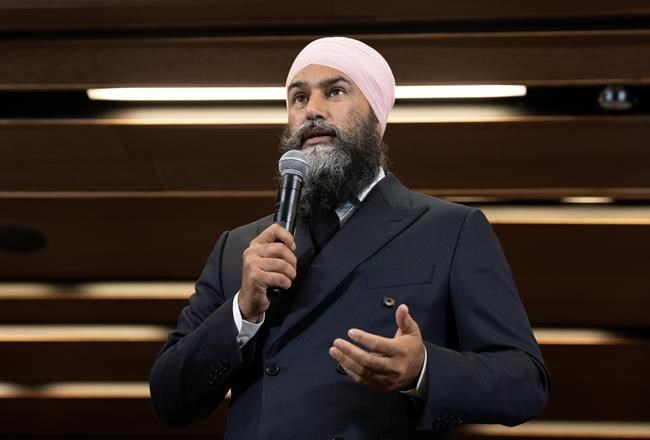OTTAWA ŌĆö The federal government should follow the lead of British Columbia's premier and ask the Bank of sa╣·╝╩┤½├Į to stop raising interest rates, the New Democrats said Wednesday.
The central bank has raised interest rates 10 times since March 2022 in an effort to curb inflation plaguing sa╣·╝╩┤½├Į, and many other countries, in the post-pandemic recovery period.
On Wednesday, the central bank announced it would hold the key interest rate at five per cent as signs of a weakening economy grow.
But leading into that decision, sa╣·╝╩┤½├Į Premier David Eby wrote to Bank of sa╣·╝╩┤½├Į governor Tiff Macklem and asked him not to hike rates again as Canadians struggle to pay for food and rent.
NDP Leader Jagmeet Singh applauded that move and in an address to his caucus in Ottawa on Wednesday said the Liberals should be reconsidering the central bank's mandate to ensure it puts people first.
"Make no mistake ŌĆö high interest rates hurt Canadians," Singh said, citing the soaring costs of food and housing.
"And itŌĆÖs time for Justin Trudeau, whose government sets the mandate for the Bank of sa╣·╝╩┤½├Į, to clearly give the message that policies that hurt workers and families are wrong," he said.
The Bank of sa╣·╝╩┤½├Į's mandate is renewed every five years through an agreement with the federal government. Its mandate, which was last renewed in late 2021, outlines that the primary goal of monetary policy is to maintain a two per cent inflation target.
Pressed for clarity on what Singh meant, NDP director of communications Alana Cahill said the Liberals could ask the central bank to stop raising rates as part of regular discussions between central bank staff and public servants at the Finance Department, as well as between the governor and federal finance minister.
"Liberals can use those discussions to request a halt on ŌĆ” rate increases," Cahill said in a written statement.
She also wrote that when it comes time to review the central bank's mandate, there should be "a serious discussion about adjusting it to ensure that the impacts of raising interest rates on working people and growing income inequality are always taken into consideration."
Since the onset of the COVID-19 pandemic, the Bank of sa╣·╝╩┤½├Į has faced heightened political scrutiny for its policy decisions, including its sharp interest rate increases over the last year.
In May 2022, when Conservative Leader Pierre Poilievre was running for the party's leadership, he said he would fire the Bank of sa╣·╝╩┤½├Į governor, calling Macklem an "ATM" for Prime Minister Justin Trudeau's spending habits.
Several premiers have added their voices to the criticism of the bank, including Eby, who leads the sa╣·╝╩┤½├Į NDP, and Ontario's Progressive Conservative Premier Doug Ford, who also wrote Macklem about the issue last week.
This scrutiny has fuelled concerns about political interference. While the government helps set the overall mandate for the central bank, its operations ŌĆö including interest rate decisions ŌĆö are independent of the government.
Laval University economics professor Stephen Gordon says the finance minister could issue a directive to the Bank of sa╣·╝╩┤½├Į governor. If that directive isn't followed, the governor would have to resign.
But that power shouldn't be used lightly, Gordon says, noting it would affect the Bank of sa╣·╝╩┤½├Į's credibility to conduct monetary policy.
"It would generate a political and financial and economic crisis for no good reason," Gordon said.┬Ā
That's why issuing a directive would be a "last-minute resort in case the governor of the Bank of sa╣·╝╩┤½├Į goes rogue," he said.
Gordon said critiques from premiers amount to "political grandstanding," given they have no power over the Bank of sa╣·╝╩┤½├Į.
However, comments or suggestions from the federal finance minister hold weight, he said.┬Ā
On Wednesday, Finance Minister Chrystia Freeland responded to the central bank's decision to hold its key interest rate with a statement calling it "welcome relief to Canadians." At the same time, she said the Liberals respect the independence of the Bank of sa╣·╝╩┤½├Į as it works to "return inflation to target."
"We also understand that an independent central bank is a cornerstone of sa╣·╝╩┤½├ĮŌĆÖs broader institutional stability, and economic and fiscal policy credibility," Freeland later told reporters in Toronto.
"As the bank continues its important work, my number 1 priority is to use all the tools at my disposal and to work with partners at other levels of government across sa╣·╝╩┤½├Į to ensure that interest rates can come down as soon as possible."
During the 2011 federal election, Jack Layton, who was then leader of the NDP, said he thought the Bank of sa╣·╝╩┤½├Į should stop raising interest rates because debt levels for Canadians were high.
The NDP was riding high in the polls by that point in the campaign, which ultimately saw the party form the official Opposition. The comment about the Bank of sa╣·╝╩┤½├Į prompted immediate backlash with then-Conservative finance minister Jim Flaherty, who called it "amateur hour."
Layton walked his comments back the next day, saying conversations between the government and Bank of sa╣·╝╩┤½├Į governor could be robust but that the government should not overstep the bounds of the bank's independence.
This report by The Canadian Press was first published Sept. 6, 2023.
Alessia Passafiume and Nojoud Al Mallees, The Canadian Press



